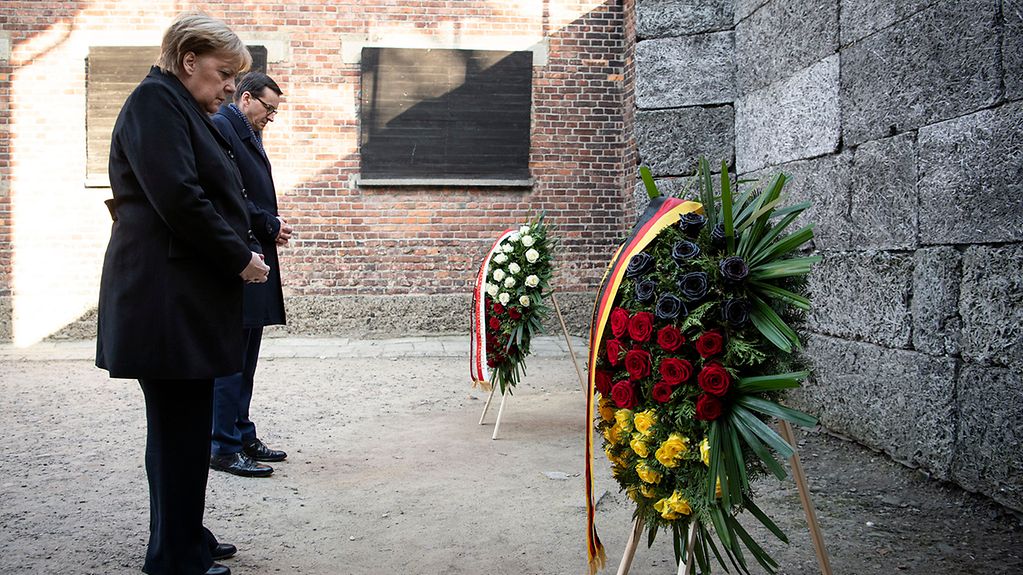Angela Merkel visits Auschwitz
In the former German concentration camp in Auschwitz, Chancellor Angela Merkel has paid tribute to the millions of victims of the Holocaust. The Auschwitz-Birkenau Foundation invited her to visit the concentration camp.

Chancellor Angela Merkel, accompanied by Polish Prime Minister Mateusz Morawiecki, laid a wreath at the Death Wall
Photo: Bundesregierung/Bergmann
"This place obliges us to keep the memories alive. We must continue to remember the crimes perpetrated here and we must call them by name," said Chancellor Angela Merkel in the presence of the Polish Prime Minister Mateusz Morawiecki to an audience of Holocaust survivors and other invited guests.
Angela Merkel declared that she felt "a deep shame in the face of the barbaric crimes perpetrated by Germans here – crimes of an enormity that is simply unfathomable".
Remembering millions of victims
Earlier, the Chancellor and the Polish Prime Minister had visited the former main camp in Auschwitz. Angela Merkel laid a wreath at the Death Wall and observed a one-minute silence. Thousands of prisoners were shot at the Death Wall. Accompanied by the Polish Prime Minister, Angela Merkel then walked through the former extermination camp Birkenau. Where the transports arrived, carrying thousands and thousands of mainly Jewish people, deported from all over Europe, the Chancellor lit a candle, of the sort traditionally placed on graves.
"We must remember the crimes committed here and we must call them by name," said Angela Merkel. The name Auschwitz stands for the murder of millions of European Jews, "for the rupture with civilisation represented by the Shoah, whose victims included all human values."
Auschwitz, however, also symbolises the genocide of Europe’s Sinti and Roma as well as "the suffering and murder of political prisoners and representatives of the intelligentsia in Poland, of resistance fighters, prisoners of war from the Soviet Union and other countries, of homosexuals, people with disabilities and countless other people from all parts of Europe," declared the Chancellor.
The concentration camp Auschwitz-Birkenau near Kraków was the largest Nazi German extermination camp. Some 1.1 million people were murdered within the camp complex, about one million of them Jews. Around 900,000 of the deported were murdered in the gas chambers of the extermination camp on their arrival. Another 200,000 people died of disease, malnutrition, abuse or as a result of medical experiments conducted on prisoners, or were murdered later when they were no longer fit to perform forced labour. The concentration camp in Auschwitz was liberated on 27 January 1945 by Red Army troops from the Soviet Union. This day has been designated International Holocaust Remembrance Day.
Fourth visit by a German Chancellor
Since she took office, the Chancellor has visited several Nazi concentration camps and memorial sites for the victims of National Socialism, including the concentration camps in Ravensbrück, which she visited in 2010, and in Dachau, which she visited in 2013. Angela Merkel has visited the central memorial site of the state of Israel to honour the memory of Holocaust victims in Yad Vashem a total of five times, four of them in her capacity as Chancellor.
Chancellor Angela Merkel’s visit to the Nazi concentration and extermination camp in Auschwitz was only the fourth time a German Chancellor has visited the camp. She accepted the invitation of the Auschwitz-Birkenau Foundation, and followed in the footsteps of Chancellor Helmut Schmidt in 1977 and Chancellor Helmut Kohl in 1989 and 1995. The Foundation celebrated its tenth anniversary on Friday.
The Auschwitz-Birkenau Foundation was founded in 2009 by former Polish Foreign Affairs Minister Władysław Bartoszewski (1922-2015). He was imprisoned there himself from September 1940 to April 1941. Between 2011 and 2015, Germany provided a sum of 60 million euros, which is half of the capital of 120 million euros the Foundation hopes to raise. In view of Germany’s historic responsibility for preserving the memorial site, the federal government and state governments agreed to grant a sum of up to 60 million euros to the capital of the Auschwitz-Birkenau Foundation, to ensure the long-term survival of the memorial site. Other major donations have come from the governments of the USA, Poland, France, Austria, the United Kingdom, Switzerland, Israel and Russia.